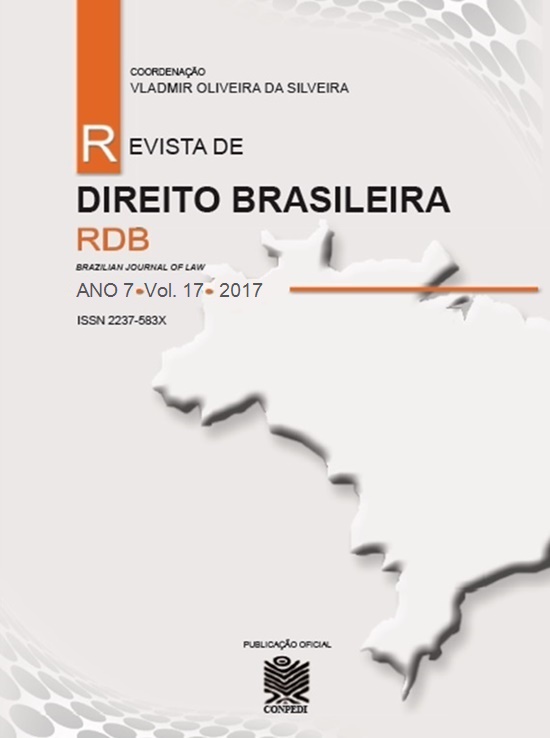LA RELACIÓN DEL DERECHO CON LA RSC
Conteúdo do artigo principal
Resumo
Este y no otro, es el contexto en el que asistimos a una repentina concienciación de las empresas por la defensa de los derechos económicos y sociales de los ciudadanos que, curiosamente, se traduce en una apuesta -o presión- por menos regulación y más autorregulación y donde la Responsabilidad Social Corporativa (RSC) constituye su ejemplo más evidente. En la misma línea, pero de forma más crítica, hay quienes afirman que solo se trata de un testimonio más, de un nuevo paradigma mundial, el globalismo, donde los estados-nación son rehenes de las instituciones financieras y grandes corporaciones internacionales. Lo que da lugar a una apropiación del Derecho internacional por parte de los poderes económicos.
¿Regulación o autorregulación? No podemos obviar que uno de los principales riesgos de la autorregulación, común a cualquier norma privada, es que podría dar lugar a que se desarrolle y trivialice la práctica del 'self service', del 'pick and choose' normativo o, dicho en otras palabras, del Derecho a la carta; es decir, la capacidad de las grandes corporaciones transnacionales para «legislar» y delimitar el alcance de su responsabilidad.
Downloads
Detalhes do artigo
• O(s) autor(es) garante(m) que a contribuição é original e inédita e que não está em processo de avaliação em outra(s) revista(s);
• A revista não se responsabiliza pelas opiniões, ideias e conceitos emitidos nos textos, por serem de inteira responsabilidade de seu(s) autor(es);
• É reservado aos editores o direito de proceder ajustes textuais e de adequação do artigo às normas da publicação.
Autores mantêm os direitos autorais e concedem à revista o direito de primeira publicação, com o trabalho simultaneamente licenciado sob a Licença Creative Commons Attribution que permite o compartilhamento do trabalho com reconhecimento da autoria e publicação inicial nesta revista.
Autores têm autorização para assumir contratos adicionais separadamente, para distribuição não exclusiva da versão do trabalho publicada nesta revista (ex.: publicar em repositório institucional ou como capítulo de livro), com reconhecimento de autoria e publicação inicial nesta revista.
Autores têm permissão e são estimulados a publicar e distribuir seu trabalho online (ex.: em repositórios institucionais ou na sua página pessoal) a qualquer ponto antes ou durante o processo editorial, já que isso pode gerar alterações produtivas, bem como aumentar o impacto e a citação do trabalho publicado (Veja O Efeito do Acesso Livre) emhttp://opcit.eprints.org/oacitation-biblio.html
Referências
BARKEMEYER, R.: Beyond compliance–below expectations CSR in the context of international development, en Business Ethics: A European review, Vol.18, nº. 3. 2009.
BECK,U.:¿Qué es la globalización? Falacias del globalismo, respuestas a la globalización,. Barcelona, 2008.
BENERIA, L, y SARASÚA, C.: Delitos y crímenes económicos contra la humanidad. Revista de economía crítica, 2011, no 12.
BORGIA, F.: La soft law come strumento di regolamentazione delle attivitá delle imprese multinazionali, en Diritto del commercio internazionale, nº. 2. 2010.
CALVO GALLEGO, F. J.: Códigos Éticos y Contratos de Trabajo: algunas notas, en FERNANDEZ DEL AMOR, J. A. y GALA DURAN, C. (Coords.) La responsabilidad social empresarial: un nuevo reto para el Derecho. Madrid. 2009.
DIARIO RESPONSABLE. Edición digital de fecha 26/06/11. Sitio Web: www.diarioresponsable.com
FEENEY, P.: «Empresas y Derechos Humanos: la lucha por la rendición de cuentas en la ONU y el rumbo futuro de la agenda de incidencia», en Revista Internacional de Derechos Humanos. V.6, nº 11, 2009.
FUENTES GANZO, E.: “La responsabilidad social corporativa. Su dimensión normativa: implicaciones para las empresas españolas”. Nº.3. Pecunia, 2006.pp. 1 a 20.
HERNÁNDEZ GIL, A.: Derecho y Responsabilidad Social [versión electrónica], diario El país, 2008, 4 de agosto.
HERNÁNDEZ ZUBIZARRETA, J., y RAMIRO, P.: “¿Una corte mundial para las multinacionales?” [versión electrónica], en Diagonal, 2009, 15 de Septiembre.
LÓPEZ, D.: La responsabilidad laboral de las empresas multinacionales, Santiago de Chile. 2007.
NIETO, A.: Responsabilidad social, gobierno corporativo y autorregulación: sus influencias en el derecho penal de la empresa, en Política, nº 5. 2008.
ÖZDEN, M.: Sociedades transnacionales y Derechos Humanos, Paris 2005, pág. 20.
PRANDI, M., y LOZANO, J.M.: La RSE en contextos de conflicto y postconflicto: de la gestión del riesgo a la creación de valor. Barcelona 2010.
REMIRO, A., RIQUELME, R., DÍEZ, J. ORIHUELA, E. Y PÉREZ-PRAT, L., Derecho Internacional: curso general. Valencia. 2010.
SCHICKENDANTZ, C.: El principio de subsidiariedad en la Iglesia: Breve historia, discusiones recientes y campos de aplicación práctica. Teología y vida, 2001, vol. 42, no 3, p. 280-291.TEITELBAUM, A.: La armadura del capitalismo. El poder de las sociedades transnacionales en el mundo contemporáneo, Barcelona. 2010.
TJCE, sentencia de 4.12.1974, Van Duyn, asunto 41/71, Rec. 1974.
UNIÓN EUROPEA. Directiva 2005/29/CE del Parlamento Europeo y del Consejo, de 11.05.2005, sobre las prácticas comerciales desleales de las empresas en la relación con los consumidores en el mercado interior, Art. 6 Nº 2 (Diario oficial de la Unión Europea Nº L 149 de 11/06/2005).
VCLAPHAM, A.: Rethinking the Role of Non-State Actors Under International Law. Oxford. 2006.





